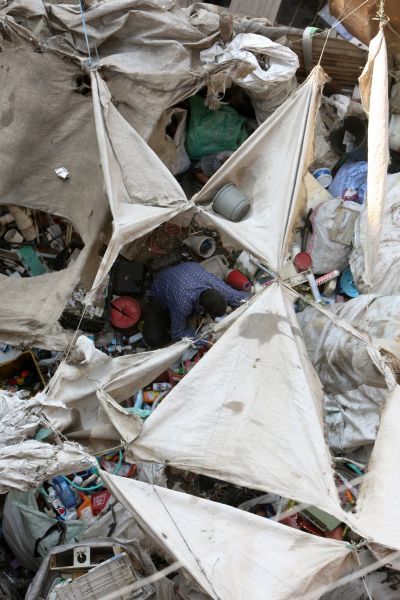Turning trash into treasure, and keeping it green in Cairo

Your support helps us to tell the story
From reproductive rights to climate change to Big Tech, The Independent is on the ground when the story is developing. Whether it's investigating the financials of Elon Musk's pro-Trump PAC or producing our latest documentary, 'The A Word', which shines a light on the American women fighting for reproductive rights, we know how important it is to parse out the facts from the messaging.
At such a critical moment in US history, we need reporters on the ground. Your donation allows us to keep sending journalists to speak to both sides of the story.
The Independent is trusted by Americans across the entire political spectrum. And unlike many other quality news outlets, we choose not to lock Americans out of our reporting and analysis with paywalls. We believe quality journalism should be available to everyone, paid for by those who can afford it.
Your support makes all the difference.In an attempt to help curb the city's stifling pollution and meet their energy needs too, a few Cairo families have begun to recycle waste -- now that the nation's pigs are gone -- by generating biogas from rubbish.
In an attempt to help curb the city's stifling pollution and meet their energy needs too, a few Cairo families have begun to recycle waste - now that the nation's pigs are gone - by generating biogas from rubbish.
It is an ambitious project that is still in its infancy but may just catch on in this teeming city of 18 million people, often obscured in a dirty grey veil of haze produced mainly by the fumes from millions of car exhausts.
The idea has taken added urgency since the slaughter earlier this year of the nation's pigs - wiped out on government orders supposedly to prevent the spread of swine flu - which would otherwise have eaten much of the waste.
The plan to transform organic waste into alternative energy was started by an American, Thomas Culhane, in east Cairo's Manshiet Nasser slums, which are known locally as Garbage City.
He runs Solar Cities, a non-governmental organisation that looks to design and develop technologies that solve very local problems.
Following a grant from the US Agency for International Development (USAID) in 2007, he has been installing solar panels to produce hot water for families in Garbage City.
This is where thousands of freelance trash collectors called zabaleen, who are mainly Coptic Christians, hand-sort through tons of rubbish collected from the streets of the megalopolis and then sell recyclable material.
The idea was well received and began to spread to the neighbouring mainly Muslim area of Darb al-Ahmar, prompting Culhane and Hanna Fathy, a Manshiet Nasser resident involved in the scheme, to offer families "biogas digesters."
Made from two simple plastic tanks and tubes, the digesters convert organic matter into biogas through a process in which bacteria decompose the matter to produce methane for cooking and fertiliser which can then be resold.
"One man's garbage is another man's gold mine. One woman's trash is another woman's treasure," Culhane said.
The alternative would be that "I would be throwing this garbage out in the streets, there would be rats, flies, cats and dogs."
The solar panels allow a family of 10 to save around 30 Egyptian pounds (5.4 dollars) a month, and biogas trims a further 10 pounds monthly.
This can mean valuable savings in Egypt, where the average household salary is around 100 dollars a month.
So far, however, Solar Cities has installed just 30 solar panels and seven biogas digesters.
The main hurdle is cost. Solar panels cost up to 2,400 Egyptian pounds and the digesters cost 700 Egyptian pounds, in a country where gas and fuel are heavily subsidised by the government.
"It's a very good system which has a future here, especially now that they have killed our pigs," insists Fathy, who says he remains optimistic about the project despite the obstacles.
In May, Egypt ordered the slaughter of the nation's 250,000 pigs as part of swine flu prevention measures, even though the World Health Organisation said that taking such a drastic measure was not scientifically justified.
The pigs, which ate the teeming city's organic waste, were already involved in a recycling process that provided revenue for their owners.
"In the past they fed the organic waste to the pigs but even the pigs could not eat it all," Culhane said.
"Now the pigs are gone and there is nothing to transform Cairo's organic waste into safe products except biogas digesters."
"I miss the sound of the pigs," Fathy said, gesturing to the slum's rooftops where the zabaleen have now taken to raising goats and chickens.
"These animals can't swallow what the pigs use to," he said.
"We don't have big goals, we just want to be catalysts, to spread seed by seed a garden of solutions that make sense," Culhane said.
If the systems were applied on a large scale, he said, "we could solve 50 percent of Egypt's pollution problem and eliminate mechanically the organic garbage problem."
Solar Cities has approached other local organisations, including the Association for the Protection of the Environment (APE) and the Association of Garbage Collectors, to try to promote their projects.
Culhane's group built biogas digesters for them to showcase the technology locally.
"We won't convince people if they don't see it for themselves," Fathy said.
Laila Iskandar Kamel is an environmental and social activist who runs the Community and Institutional Development group (CID), a consulting group that specialises in waste management.
She said the project is a "good idea," but also believes that "in addition to the organic waste, it should make use of the human waste because there is a serious problem of seepage in the neighbourhood."
Join our commenting forum
Join thought-provoking conversations, follow other Independent readers and see their replies
Comments